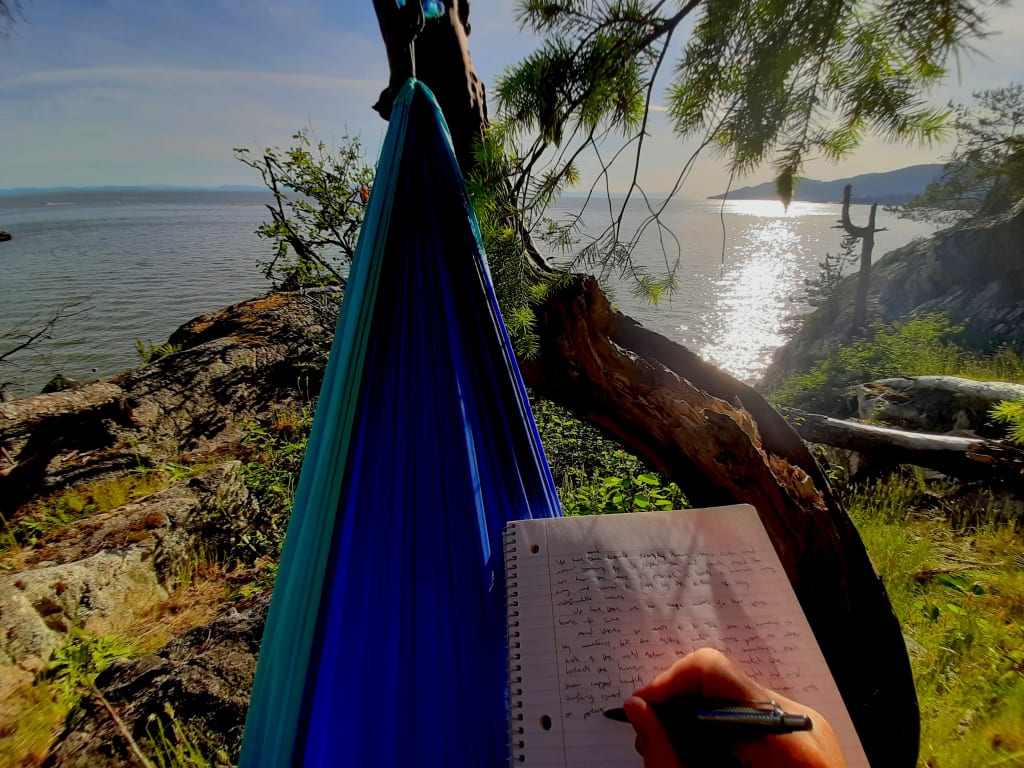Beginner’s Mind and the Reclaiming of Awe
Encountering the natural world can make you smarter

Up here, sound travels strangely.
Human voices echo and waver, bouncing off sun-striped sea and granite cliffs. You can hear the voices of passengers in boats a kilometre away, every word carried to shore by the action of tiny indestructible waves.
Up here, there are no magic mirrors. Up here, space turns into time.
There’s plenty of it. The sea is hemmed in by mountains, but the restless water comes from the other side of the world. Under the humpbacked hills that breach the horizon, the ocean depths below match the snow-streaked heights above. Trees grope for light and wind, twisting toward a blue sky that for all we know goes on forever.
Up above, the sun sheds 700 billion tons per second. The stars are our sisters, and they bleed just like us. The life they pour out on us bursts in bright blood on my arm as I slap a mosquito to death. There will be plenty more.
And up here, among the drifting voices, the rustle of leaves, the ecstatic chirp of hummingbirds, I hear other things too. Voices I know aren’t real, can’t be real, hang in the sibilant silence between one wave and the next. In this sacred patch of forest overlooking the boundless ocean, everything I’ve ever lost comes back to me.
In nature, if something works, it works.
All that matters is that we live long enough to pass along our genes and ensure our offspring’s success. If some wrongheaded ideas or obnoxious character traits help achieve that goal, they will be preserved and selected for by the blind uncaring mechanism of evolution.
We don’t notice much. And the more we think we know, the less we start to see. A little knowledge is a dangerous thing, and a little education can be even more so. A 2015 study found that people with degrees routinely overestimated their knowledge of their subject. But we’re all doing this, all the time.
The mental model of the world in which we live and move is perfectly adequate for most purposes, and so we rarely question it. A tree is a tree, and a car is a car. When you’re rushing to work or waiting anxiously for your test results, there is little incentive to question how you look at the world.
The products of this are everywhere. The thick dark streak of anti-intellectualism that runs through our culture is one of them. In the endless chatter of online voices, one person’s ignorance is as good as the next person’s knowledge.
The minute we start to think we know what we’re talking about, we shut the door on further learning. Even though humans have proven to be consistently wrong about everything. Nearly every scientific belief held a thousand years ago has since been overturned. The evolution of ideas should be a constant reminder that we are almost always mistaken.
The Zen Buddhist term shoshin is usually translated as beginner’s mind. It refers to exactly this phenomenon, the closemindedness that can attend knowledge. Zen practice encourages the cultivation of beginner’s mind so that our ideas never calcify. By maintaining an attitude of intellectual humility, we stay open to a broader range of possibilities.
Some of us are inveterate awe chasers.
You can’t choose to fall in love, no matter how hard you try. You can’t make yourself experience wonder at the beauty and enormity and intricacy of the world you stumble into, a clumsy actor who doesn’t know their lines. But you can put yourself in awe’s path.
How you do it is up to you. Not everyone has access to the coastal forests I do. But nature is always a reliable source of awe. An encounter with something bigger than yourself that nevertheless finds a wordless echo in some recollecting cavern of your heart.
Time can turn into space, too. The vaulted hush of the cathedral, the shadow-haunted ruin of some time-conquered castle, the touching simplicity of a peasant’s hut. All are repositories of wonder.
Depending on how good your eyes are, you can find it anywhere. In a lecture, Alan Watts talked about seeing the glory of the universe in a paper cup. There’s awe in the anthill and wonder in the wasp’s nest. You just need to look.
An experience of awe is one of the best ways to cultivate beginner’s mind. It’s hard to be arrogant on the summit of a mountain or the shore of the sea, confronted with something so much older and vaster than yourself.
It’s not just me saying it. This study found that people who’ve recently experienced something truly awesome were less set in their views of the world and more willing to entertain other possibilities.
This study showed that experience of awe made people more aware of the gaps in their knowledge and more interested in filling those gaps. The more you experience a sense of awe, the more likely you are to seek out another.
But it doesn’t take peer-reviewed research to tell you that. You only need to look up at the night sky. A meteor shower or the breathtaking spectacle of the Aurora Borealis makes it virtually impossible to feel like you know anything at all about a world that holds such beauty.
Any encounter with nature, even the weeds in your backyard or a spiderweb on your balcony, can be enough to remind you that we live surrounded by unfolding miracles.
No matter where you find it, a sense of wonder will lead you back to something we all had and have forgotten.
The bright sun of childhood and the open hearts we used to possess. When we knew that we knew nothing, we understood more than we do now. Our defenses were less developed. We didn’t have to peer over crenelated walls. It was all a wonder. Even the flies. Even the rotten logs that bob and rock on the foam-patterned water below.
I’ve been here dozens of times. But it doesn’t feel that way. If Heraclitus was right and we can’t step into the same river twice, we certainly can’t look out on the same ocean. Forest and sea never stand still, and even the mountains are moving, too slowly for us to see.
There is no silence between one wave and the next.
The incoming wave breaks over the head of the outgoing one.
Approaching the world with a beginner’s mind will make you smarter. Understanding the depth of your own ignorance is the starting point of wisdom. But it will do much more for you than that.
Shoshin can give the world back to you. Drop by drop, day by day, our hearts fill up with smoke. But each new morning, it’s a different world that greets us, a different sun that makes unnamed flowers bloom. The bright immensity of the sea and the sky are enough to fill your heart if you let them. We never see more clearly, more wonderfully, more appreciatively, than when we see for the first time.
About the Creator
Ryan Frawley
Towers, Temples, Palaces: Essays From Europe out now!
Novelist, entomologist and cat owner. Ryan Frawley is the author of many articles and stories and one novel, Scar, available from online bookstores everywhere.






Comments
There are no comments for this story
Be the first to respond and start the conversation.